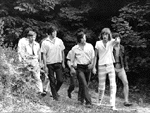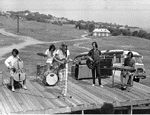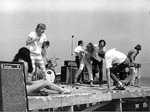
| Péter Sneé | Impossible undertaking |

|
András Kisfaludy: A Ship Has Flown Away in the Wind I.-II. KEX
 78 KByte |
You haven't heard it? - a friend said astonished one night twenty years ago. His eyes, red from wine, jumped vaguely, wondering how seriously he can take my ignorance. He was looking for words to express his outrage deeply enough and touched his then only moderately greying beard. Then he shrugged, took one of the numerous records piled up at the bottom of the bookshelf and carefully placed it on the player. - There you are, the Family. On the thirtieth anniversary of its formation in 1968, members of KEX have reunited in order to finally complete the album of songs of the past - after their first and to the day single recording. Director András Kisfaludy - drummer of the band - naturally took the opportunity to interview everyone who had memories of their acts - either as partakers or as fans. He didn't limit himself to simple studio-chats, he shot on location in order to bring up reminiscences of the past events and to make it easier for the storytellers to relive old times. Seeing the vague look in the eyes of the speakers and hearing his own voice bursting with excitement, it seems that his efforts were in vain. They seem to be talking without being asked and they themselves claim that they are talking of a great experience. Their gestures, position and the tension they radiate suggest that they evoke fate-twisting moments and reassure us that the performances which they listened to and took part in indeed lived up to the Rilke level of art. Members of KEX (among them the recently passed guitarist Attila Imre) and their supporting musicians: Gyula Babos, Hobo and others talk sentimentally - no wonder, since they are remembering the best years of their youth, when they had their first and possibly biggest success. Their part in the process must have had lots of personal experiences besides whatever the creation process itself provides (pianist Miklós Doleviczényi offers us a whole bunch of them), however, we cannot doubt the other witnesses' reminiscences. Péter Makara, László Najmányi, Ildikó Szabó, György Szomjas, János Vető, László Méhes, Jenő Balaskó and Gyula Pauer - to mention only a few - unanimously acknowledge the wonderful power of these acts. We know very little about the nature of this wonder, however much they strive to express what happened to them then. They don't simply tell, but with their gestures and exclamation also enact, imitate the past events. The viewer cannot help but wonder about this farce and try to guess what makes the presenters feel so enlit by it. He sniffs at stupid jokes of seemingly improvised, but due to the camera stand and lighting, carefully rehearsed theatrical shows, is irritated by winebar razzamatazz, gets upset by kindergarten foolishness. Do they really think that he believes: this is all that poured forth from the spring of today's fifty-year-olds' generation feelings? No doubt, the former young rebels are in a grotesque situation. They are all deep within mature adult life, which they so bravely rebelled against and it is rather uncomfortable that they have to make their successors understand: who they were and what they wanted. Fat, wrinkled, bald or greying society-formers of respectable wealth tell stories about the romantics of resistance and the glory of renewing the world. Retired rock star recalls the miserable beginnings, influential politician talks about the immemorable adventure of how he was beaten, accepted author consults past efforts and places them in the structure of knowledgeable rules of aesthetics. What sort of absurdity is that? We step back in time with the help of documents, although the atmosphere of past eras can only be regenerated within our minds. However much the partakers try to bring it back, what on earth reaches us from that? People born in the fifties-sixties can easily tune in to the frequency of the reminisces, after all, which one of them doesn't have memories with the police? If only once they set their feet into the volunteer punishment camp called the Youth Park, they need no introduction to Rajnák with the rubber stick, but what can the younger do with these romantic visions - ones who are only sensitive to having a good time and have no idea why the knife gets stuck in the air once the Green-yellow song is played? With our present understanding it is impossible to explain the stupid games of the Homo ludens of past times. Isn't it shame enough to get baggy as speaker for the youth, do they really also expect applause for their pathetic act? When we see tastier, spicier, occasionally ruder jokes in any radio or TV cabaret, what's the excitement and the razzamatazz for? Our doubts could only be replied in an effective, straightforward way by the original productions. Let's see the parodies, improvisations, performances and happenings, how do they work now? The problem is that apart from a few exceptions (like Enchanting Girl by György Szomjas or Don't Cry Pretty Girls by Márta Mészáros) no moving pictures or sound recordings have survived of the band. All András Kisfaludy can do is rely on the memory of witnesses, however little they live up to the expressive power of their idol. A Ship Has Flown Away In The Wind tells as little of KEX as the ones interviewed. The title is misleading, since instead of the band we get to know its central figure, János Baksa Soós. He is evoked, talked about, his deeds are discussed. Without him there is no performance, what he does on stage and in the street is all that counts. His life is a constant show, if we are to believe the unanimous claim of witnesses, his bravery and integrity is exemplary. He teaches his circle to think and his whole personality is a warning about the lack of freedom. What remains for us? - he asks - only our hearts and our faith! The way he quotes 'Tiszta Szívvel' (a poem by Attila József- the editors) sounds like an ars poetica of his generation. Although legends are recalled about the bravery of this not too bulkily built young man, it is doubtful that he needed extravagant street shows to catch the attention of dictatorship's lords. László Najmányi is right to believe that if he hadn't left the country in time, he would have been beaten to death. His importance is emphasized by the fact that after his departure in 1971 the capital seemed frighteningly empty, his followers lacked for years the illusion of freedom that his performances in Citadel or on Cocktail-boat provided. These are meaningful locations, saying a lot about isolation: the farther away from existing socialism, the better! His weakness must have been exactly this aversion mixed with the desire to perform - his extreme opposition deprived him of the opportunity of reaching a wider public. Sándor Csukás' camera works with the sharpness of a cartographer: Baksa's world limits itself to the city centre and the posh Buda districts. His followers are intellectuals-to-be, mainly young artists with sufficient means brought from home. For them it is no problem to pay an entrance fee to a club and it is natural that they accompany their favourites to the Fészek. Once they are forced from their own territory to Zugló, they need the so far hostile policemen's protection against the attacks of their unknowing generation-members. Which leads some light on the deep social tensions within the society of equality as well as on the political strategy of the secret service paying much attention to their activity: divide et impera! For quite understandable reasons the reminisces emphasize the latter and their words are even more underlined by a directorial idea: the dramatised presentation of recently surfaced secret service reports and measuring orders. András Kisfaludy builds up situations thus and sometimes he even succeeds in recollecting the damp atmosphere, but still he cannot make up for the viewer's lacking contextual knowledge, without which the particular episodes are undefined and unenjoyable.We are left out of his controversial world the way Baksa Soós was left out of the one of dictatorship. Our admiration is more and more aimed at a strange champion and not at our predecessor and spiritual leader. We are almost bending towards seeing him as an angelic clown rising in the eternal purity of his magical youth above the miserable filth of our everydays, when from the high ideals of our etheral imaginations reality grabs us violently. In the last minutes of the second hour of the film we are suddenly faced with a thin, wasted, whimsical character, who not only exchanged home, name and profession (he is making fairy-tale figures out of wood), but also exchanged an era. As if drugged difference remodelled this eternal youth fighting against old age. Like Jacob and the angel, the wrestle but cannot win one over the other. The quivering gestures, the vagabond smile and the willingness of soul reminds us of the past, but the stiff muscles, the long scull and the vague look in the eyes belong to old age. It is up to our own age, whether we laugh at him or rather cry. A horrible sight, a shameful disgrace! The history of art cannot be reproduced without works of art. Unless they capture our imagination, evoke it with global vision or suggestive imagery, it remains dry and data-like. What business is it of ours, unless our youth? Without recreation and recording it is impossible even a single decade later to understand and present to others the reasons and sources of our experiences. We turn into pathetic greybeards left alone with our own opinions and no hommages can push us back to the living conscience of the public. We are closed into our own time and are personally excluded from the wide historical memory. Is that such a big problem once we have passed on our heart and faith? What else can we leave behind besides our work? A ship has flown away in the wind. |
 65 KByte
|  54 KByte |
